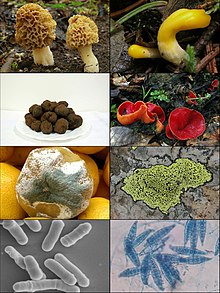| Dikarya | |
|---|---|

| |
| Diversity of Basidiomycota, which includes (clockwise from top-left): fly-agaric (Amanita muscaria), Dacrymyces palmatus, porcini (Boletus edulis), Uromyces rumicis (in the Uromyces genus of rust fungi), Meredithblackwellia eburnea, bamboo mushroom (Phallus indusiatus), azalea gall (Exobasidium vaccinii), and red cage (Clathrus ruber) | |

| |
| Diversity of Ascomycota clockwise from top-left, which includes common morel (Morchella esculenta), Neolecta vitellina, scarlet elfcup (Sarcoscypha austriaca), Rhizocarpon, Microsporum canis, fission yeast (Schizosaccharomyces pombe), Penicillium, and black truffle (Tuber melanosporum) | |
| Scientific classification | |
| Domain: | Eukaryota |
| Kingdom: | Fungi |
| Clade: | Symbiomycota |
| Subkingdom: | Dikarya Hibbett, T.Y.James & Vilgalys (2007)[1] |
| Divisions | |
| Synonyms[1][2] | |
|
Carpomycetaceae Bessey (1907) | |
Dikarya is a subkingdom of Fungi that includes the divisions Ascomycota and Basidiomycota, both of which in general produce dikaryons, may be filamentous or unicellular, but are always without flagella. The Dikarya are most of the so-called "higher fungi", but also include many anamorphic species that would have been classified as molds in historical literature.[1] Phylogenetically the two divisions regularly group together.[3][4] In a 1998 publication, Thomas Cavalier-Smith referred to this group as the Neomycota.[5]
- ^ a b c Cite error: The named reference
Hibbett_2007was invoked but never defined (see the help page). - ^ Hibbett, DS; Blackwell, M; James, TY; Spatafora, JW; Taylor, JW; Vilgalys, R (July 2018). "Phylogenetic taxon definitions for Fungi, Dikarya, Ascomycota and Basidiomycota". IMA Fungus. 9 (2): 291–298. doi:10.5598/imafungus.2018.09.02.05. PMC 6317587. PMID 30622884.
- ^ Cite error: The named reference
Lutzoni_2004was invoked but never defined (see the help page). - ^ Cite error: The named reference
James_2006was invoked but never defined (see the help page). - ^ Cite error: The named reference
CavalierSmith1998was invoked but never defined (see the help page).